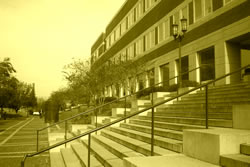|
|||||||
|
|
|
Home |

|
August 29th: Futurism and F. T. MarinettiAnnouncements Moodle2 Posts I have a prompt for you on Moodle2 to respond two by 11:59pm on Thursday, August 29th. I will try to have the pormpts for Thursdays up by class on Tuesdays. Finish up Heinlein's "All You Zombiesó" (1959)
Heinlein is a famous (and controversial) science fiction writer. He might be best known for his novel Starship Troopers (1959), which has a movie adaptation that pokes fun at the audience. Heinlein and Asimov (along with Arthur C. Clarke) are considered the three greatest science fiction writers from the "Golden Age of Science Fiction" (the 1950s were part of that age but in a transition). Although this stigma is still part of people's views of science fiction, Heinlein was instrumental in raising the literary bar of science fiction from goofy entertainment to a thought-provoking genre.
Heinlein is important as a bridge between an artificial distinction in science fiction:
Of course, this class is more concerned with social science fiction because we're reading science fiction in order to discuss culture. Fans of hard science fiction often get hung up on the plausibility of technologies and might consider a works value based on it ability to predict the future. Heinlein was an engineer, so he understood the science behind space flight, satellites, and communication technologies. Heinlein and other science fiction writers of this Golden Age were instrumental in exciting public imagination about other worlds and space travel. That's important for citizens to get behind government initiatives for rockets, satellites, and, of course, the space race.
The Paradox of Jane/Bartender/Single Mother
This isn't just a story about a guy who, using time travel, fathers and mothers himself and spills his/her guts to himself who serves him drinks. That's confusing, but we need to think metaphorically. Although we're not coming up with THE meaning and, instead, looking for a meaning, let's consider the following themes Heinlein's story could be directing us to think about:
Heinlein's text could be telling readers that we construct our own realities. Think about this with a postmodern lens—no grand narrative. Even if we're social products, we still pick and choose and filter information from our own points of view. The word solipsism is good for this discussion: only the self can actually be known and knowledge beyond oneself can't truly be verified. Zombies are metaphors for the masses—for people. People who are considered non-thinkers are called zombies. Zombies aren't necessarily aimless; they just don't understand why they're engaging in the behaviors they carry out. When we get to consumerism, we'll discuss zombies again. F. T. Marinetti: Manifesto Poet F. T. Marinetti isn't classified as a science fiction writer, but he does write poetry and speculative works that emphasize technology being an important. That's an understatement: Marinetti LOVED technology and celebrated the (usually militaristic) the technologies of his time period and contemplated the technologies of the future. Futurism is consider the first major -ism of the Historical Avant-Garde period of Modernism. Marinetti and the Futurists exaggerated the potentials of technologies, which is common in science fiction genres. Let's take a closer look at F. T. Marinetti and Futurism. Next Week Enjoy the Labor Day Weekend, and finish reading H.G. Wells's The Time Machine (1895). It's a quick read. As usual, we'll catch up on any Futurism and Marinetti stuff we didn't get on Tuesday. Don't forget to post a reflection to this week's Moodle2 prompt by Midnight.
... |
||||||||||||||||||||||||||||||||||||||||||||
|
|
|||||||||||||||||||||||||||||||||||||||||||||
| © UNC Charlotte Copyright | Privacy Statement | Page Maintained By: Aaron A. Toscano |
